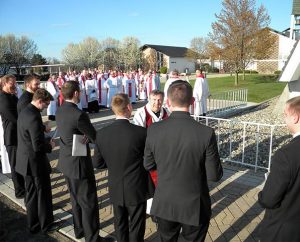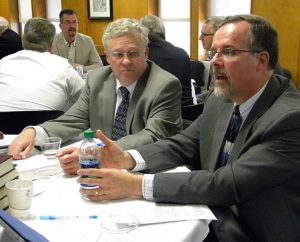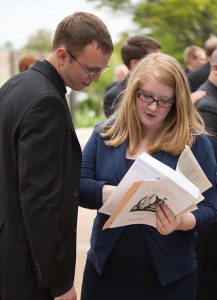By Joe Isenhower Jr. (joe.isenhower@lcms.org)
FORT WAYNE, Ind. — For the first time in many years, the Synod’s Council of Presidents (COP) — at its April 25-29 meeting — did not have enough certified candidates for first pastoral calls to fill all the requests of congregations and Synod-related entities in North America.

Similarly, there were not enough vicarage candidates to fill all the requests for men to serve their year of pastoral “internship.”
During its spring meeting at Concordia Theological Seminary, Fort Wayne (CTSFW), the COP assigned 124 first calls (30 short of the 154 calls that were available to be filled) and assigned 112 men to vicarages (compared with 133 vicarage assignments available).
The council also assigned 56 commissioned ministers to their first calls.
COP Placement Committee Chairman Rev. Kurtis D. Schultz, who is president of the LCMS Southern District, spoke of the “anomaly [that] for the first time in many years, we had so many calls unfilled.”
Schultz said that “one of the contributing factors [was] the small number of seminary candidates.”
“Obviously,” Schultz told the COP and placement-committee members from the two LCMS seminaries, “we need to be encouraging in every possible way those men who wish to prepare for the Office of the Ministry, so that we can meet the needs of the people of the Lord’s Church.”
The council participated in placement services at the seminary here April 27 and 28, and at Concordia Seminary, St. Louis, on April 29.
Also at its spring meeting, the COP elected new officers; held an afternoon joint session with the Fort Wayne seminary faculty; heard from LCMS President Rev. Dr. Matthew C. Harrison and other Synod-staff and COP members; received a progress report from a Synod task force on Resolution 4-06A of the 2013 LCMS convention; held its final break-out discussions in the Synod’s Koinonia Project; and welcomed guest presenters who addressed church-worker care.
New COP leaders
The council elected for the next three years its program-committee leaders — essentially, those who are its officers.

Elected as chairman is LCMS Texas District President Rev. Kenneth M. Hennings; vice-chairman — Michigan District President Rev. Dr. David P.E. Maier; secretary — Eastern District President Rev. Dr. Chris C. Wicher; and two members at-large — Northwest District President Rev. Paul A. Linnemann and Minnesota North District President Rev. Dr. Donald J. Fondow. The Synod president and first vice-president serve as ex-officio members of the program committee.
Hennings, who for the past three years has been the COP vice-chairman, succeeds Pacific Southwest District President Rev. Dr. Larry A. Stoterau, who served the maximum two three-year terms as chairman.
Wicher and Linnemann continue as secretary and member at-large.
Maier and Fondow were newly elected to the program committee.
The Rev. Keith Kohlmeier, who had been a member at-large, is retiring as Kansas District president.
“I am very grateful to the men who have served with me in the last three years and for how well we’ve worked together,” Stoterau said, adding that he appreciates the willingness of those who will serve on the committee in the coming triennium.
Joint session with faculty
The CTSFW faculty’s joint session with the COP took place April 26 — the 168th anniversary of the Synod’s founding — and began with a welcome from seminary President Rev. Dr. Lawrence R. Rast Jr.
Noting that the seminary is “now into our 169th year, Rast thanked the council for “the opportunity to gather together this afternoon for … some mutual conversation and hopefully some consolation of the brethren to celebrate the fact that we share in ministry for the sake of our Lord’s mission that He has entrusted to us.”
Rast then reported several developments for the seminary here, including “upgrades” to its Doctor of Ministry program, which he termed “a great success story”; “remarkable opportunities for us in Africa”; and partnerships and conversations with districts.
In a question-and-answer session, Kohlmeier asked Rast if he could “give us a look into the future with candidates.”

“One of the things I would like to see us and the COP partner on,” Rast answered, “is to get a clear picture of the health of the congregations in your districts.” He said that would include “the number of pastors you expect to need over the next 10 to 15 years, so that we have a better way of gauging our own programs and providing services for those needs — both for existing congregations and future mission opportunities.”
To a question from Harrison about declining seminary enrollments in Master of Divinity (M.Div) students, Rast replied, “Both of our seminaries’ M.Div. populations have declined over the past five years. Maybe we’re still feeling the impact of the two years when we didn’t place everybody. That news got out and that news is remembered.”
Rast said that church workers and members of LCMS congregations still ask him, “ ‘Are you going to place everybody this year? You didn’t last year.’ We did, but they’re still thinking five years ago, when we didn’t.”
Also discussed in the joint COP-faculty session were seminary-student debt; continuing-education opportunities; and a presentation titled “Sexuality and Marriage Issues in the Public Square and the Church” led by the Rev. Dr. Gifford Grobien, director of the D.Min. program at CTSFW.
Reports from leaders, guests
Harrison began his president’s report to the COP by reading and commenting on a sermon that Martin Luther preached in Wittenberg, Germany, on March 10, 1522. He described it as “the first of Luther’s so-called Invocavit sermons of 1522 when he returned from hiding in the Wartburg Castle to straighten out problems in Wittenberg.”
Harrison told the council that he was sharing the sermon so that “you can see the way Luther preaches, the relationship he has with his congregation,”how he “relates points through his own experience” and “always emphasizes love for the neighbor.”
“Luther never separates love from faith,” Harrison said.
Concerning developments in the Synod, Harrison commented that he was “very thankful how smooth the process is going” for budgeting in the 2015-16 fiscal-year, which begins July 1. He also noted that the Synod would have “a balanced budget” for the coming year, with “half a million dollars in reserves.”
Harrison also spoke of the “significance of raising unrestricted gifts” in the Synod.
To a question of how his visitations with districts are going, Harrison said there is “some concern with the sustainability of keeping the visits going in the future, especially in years like 2015, when all 35 LCMS districts are holding their conventions.”
“The visits are invaluable,” Harrison said, “especially to sit in the same room as district boards of directors and share perspectives on topics such as worker well-being and the direction of mission. All district boards are working diligently.”
He said he is “really pleased” with the way plans are progressing for observing the 500th anniversary of the Reformation in 2017.
Later in the meeting, the Rev. Randall Golter, who leads planning for that celebration in the Synod, gave an overview of it. He emphasized the importance of the message of the observance theme, “It’s Still All About Jesus.”
Other presentations
Other presentations at the spring meeting of the Council of Presidents included:
- a progress report on the Koinonia Project by Synod First Vice-President Rev. Dr. Herbert C. Mueller Jr., in which he noted participation of 12 LCMS districts in the project, in addition to the COP’s three Koinonia groups. He listed a number of “learnings” from the project.
Mueller also reported on colloquy matters and on plans for a Sept. 22 fiscal conference primarily involving the LCMS Board of Directors, district presidents, district business managers and treasurers, and a lay member from each district board of directors.
- discussion of the need for accurate and timely reporting of statistics by all Synod congregations — important for the delegate-selection process for the 2016 LCMS convention — led by Synod Secretary Rev. Dr. Raymond L. Hartwig,
- an “in-service” on “Pastoral Calls and Vacancies” and a report from the COP’s Clergy Call and Roster Committee, by Nebraska District President Rev. Dr. Russ Sommerfeld.
- an overview of a Congregational Assessment Resource being co-developed by Mid-South District President Rev. Dr. Roger C. Paavola and former Minnesota South District President Rev. Dr. Lane R. Seitz.
- a Bible study on “Overcoming Burnout — Personal Care for God’s Servants,” by Florida-Georgia District President Rev. Gregory S. “Greg” Walton.
- a report of the task force on 2013 Synod convention Resolution 4-06A, which has to do with licensed lay deacons in the Synod.
The COP also heard from leaders of several LCMS Recognized Service Organizations and others who concentrate on church-worker care in the Synod:
- Rev. Dr. Darrell Zimmerman, vice president/program director for Grace Place Wellness Ministries;
- Dr. Beverly Yahnke, executive director for Christian Counsel with DOXOLOGY — The Lutheran Center for Spiritual Care and Counsel;
- Shepherd’s Canyon Retreat Ministry’s President Dave Anderson and Clinical Care Director Dr. Patti Brunold;
- Rev. Dr. Gary Zieroth, interim director of the Synod’s Post-Seminary Applied Learning and Support (PALS) program;
- Rev. Richard L. Koehneke, ministerial health consultant for the Indiana District, who spoke about the district’s “Caring for the Called” pilot project; and
- Rev. Dr. Bryan Salminen, who works with the Michigan District in fostering healthy church workers.
The next meeting of the LCMS Council of Presidents is set for Sept. 19-22 in St. Louis.
Posted May 19, 2015 / Updated May 20, May 22 and June 2, 2015





April is historical…May is still in progress
There are many ordained men on candidate status. Surely these congregations can be encouraged to look at them.
LC-MS you have many willing and able ordained men on candidate status, why don’t you encourage the congregations who didn’t receive a sem grad to call one of them? Why do you constantly lie saying there is a shortage of pastors?
I have observed across the synod that we should consolidate congregations with less than 75 members in worship. Especially with the current shortage of pastoral candidates. What a waste of resources for which we will have answer for. If this consolidation were to happen, I’m sure the in-fighting that would occur would make this impossible. So disregard the my suggestion!
I have seen many congregations not call seminary students but instead get a retired Pastor to fill in indefinitely. They want to cut cost, and don’t want the added expenses of paying a full-time pastor. I have seen these Retired Pastors work for free are just a per service stipend. This cuts the congregations cost on salary expense, but what is the real cost? Not developing new pastors in Seminary. Not calling new willing men. Not having full-time pastoral care at congregations? Is there really a long list of ordained pastors waiting for calls? How do we get congregations to call these pastors In waiting? Can we use them in mission work?
Let’s all pray for this seminary, the staff in leadership and for each young man who seeks education here.
I have heard for years that there is a Pastor shortage and have a son -in-law who is ordained and has been without a full time call for several years. He has a student loan debt of over $100,000.00 and Synod is doing nothing to help this and many other already ordained Pastors.
Dawn, In addition to those seeking to go to seminary and the staff; let’s all PRAY for the men who have already been through seminary waiting for a full time call, for the pastors who are presently in place and for the churches who are waiting for full time pastors, too. May God grant these men patience and wisdom to serve our LCMS congregations.